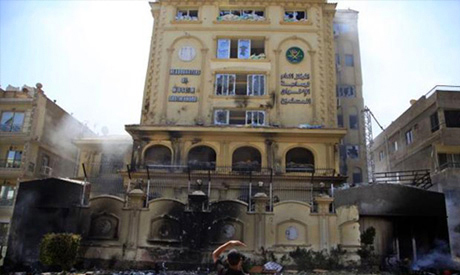
File Photo: An Egyptian protester looks at the damaged Muslim Brotherhood headquarters in the Muqatam district in eastern Cairo, Egypt, Monday, July 1, 2013 (AP)
New guidance issued by the UK’s Home Office in August states that Muslim Brotherhood members can qualify for political asylum in the United Kingdom if they are considered to be under threat of “persecution” in Egypt.
The 22-page document, entitled “Country Information and Guidance Egypt: Muslim Brotherhood,” read that asylum can be applied for over “a fear of persecution or serious harm by the state because of the person’s actual or perceived involvement with the Muslim Brotherhood.”
The guidance states that high-profile or politically active Brotherhood members in Egypt “may be able to show that they are at risk of persecution, including of being held in detention, where they may be at risk of ill-treatment, trial also without due process and disproportionate punishment.”
The document added that “high-profile supporters” or those deemed “MB supporters,” including journalists, may also be similarly at risk of “persecution,” stating that in such cases a grant of asylum would be appropriate.
However, the Home Office said that low-key, inactive members who are not “generally targeted” and would be unable to show “a real risk or persecution” may not be granted asylum, concluding that each case will be reviewed on an individual basis.
In December 2013, Egypt's interim authorities designated the Brotherhood a terrorist organisation and froze the assets of many of its members and all affiliated NGOs.
A court in 2014 banned all activities by the group, from which ousted Islamist president Mohamed Morsi hails, and ordered the confiscation of the group's assets via a state committee.
Assets of hundreds of Brotherhood members have since been confiscated by the state-led committee and alleged members have been prosecuted in mass trials over violence and terrorism-related charges.
The new UK Home Office guidance comes less than one year after a British government review concluded that membership or ties to the Brotherhood should be considered a possible indicator of extremism, but that the group should not be banned on UK soil.
Britain’s then-Prime Minister David Cameron said at the time that Britain would continue to refuse visas to members and associates of the group who have expressed “extremist” views, as well as intensify scrutiny of the activities Muslim Brotherhood members, associates and affiliates.
Egypt welcomed the British 2015 report at the time, saying that it was clear that the international community should support Egypt in confronting terrorism and extremist ideology.
Short link: